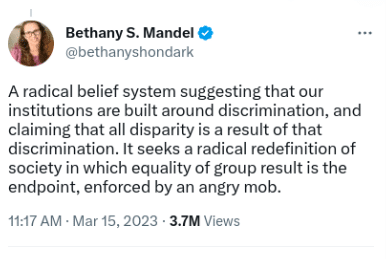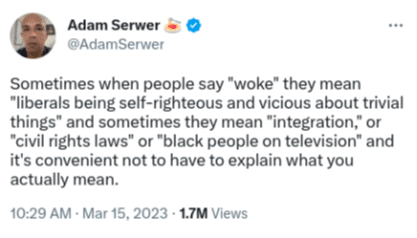The difference between the almost right word and the right word is really a large matter–it’s the difference between the lightning bug and the lightning. – Mark Twain
The word, ‘woke’ has been used since the 1940’s. In the 1971 play, Garvey Lives!, Barry Beckham wrote, “I been sleeping all my life. And now that Mr Garvey done woke me up, I’m gon’ stay woke. And I’m gon’ help him wake up other black folk.” Its original meaning was becoming woken up, or sensitised to, issues of justice. In 2017, this definition was added to the Oxford English Dictionary. Within, it is defined as being ‘aware’ or ‘well-informed’ in a political or cultural sense.
In a poll from Ipsos in 2023, 39% of the respondents believed that woke means “to be overly politically correct and police others’ words.” Bethany Mandel, co-author of Stolen Youth: How Radicals are Erasing Innocence and Indoctrinating a Generation, defined woke in a tweet as, “A radical belief system suggesting that our institutions are built around discrimination, and claiming that all disparity is a result of that discrimination. It seeks a radical redefinition of society in which equality of group result is the endpoint, enforced by an angry mob.”

Imagine Barry Beckham and Bethany Mandel having a lively debate about wokeness, and how confusing the debate would be. The definition of the word is essential to the debate and the two would quickly find themselves talking past each other.
Adam Serwer summed up the complexity of the meaning of woke when he tweeted, “Sometimes when people say “woke” they mean “liberals being self-righteous and vicious about trivial things” and sometimes they mean “integration,” or “civil rights laws” or “black people on television” and it’s convenient not to have to explain what you actually mean.”

It is convenient not to have to explain what you mean, but it is also confusing. When we are having a conversation with someone, we need to agree on what words mean, else it is like having two separate conversations that give the illusion of meeting but never actually connect.
In a conversation I had recently, we struggled to come to an agreement on the definition of racism. If that sounds preposterous to you, go and ask a few people whether it is possible for a member of a minority to be racist, or if it is possible for a person to be racist against their own race. You will probably get a few different answers. If racism were simple to define, then we should all immediately agree on the application of the word.
By the way, the answer to both questions is yes. A minority can be racist, because the definition is ‘to come to a prejudgment based on the race of an individual’; it is not only used for white people judging non-white people. And, of course, someone can prejudge a person of their own race on this basis.
Related to the confusion over those aspects of racism is the common deflection people use, “I am not racist, some of my closest friends are [race].” Regardless of the race (or gender, or religion, or political affiliation) of your closest friends, when you meet someone, do you make assumptions about that person based on their race (or gender, or religion, or political affiliation)? You can make assumptions about strangers, even if you have friends that share similarities with that stranger. It is possible for individuals to move beyond their initial prejudices and still apply those prejudices when they meet someone new.
When we are speaking with someone in the pub or on the debate stage, we need to agree on the definition of words that might be ambiguous. If accepting a definition that we disagree with is distasteful, then we might need to walk away from the conversation. On the other hand, we can move beyond the disagreeable definition and continue the conversation by saying, “While I don’t agree with that definition, for the sake of the conversation, let’s assume that it is accurate,” and then move on.
Definitions get some people in trouble, and keep other people safe
In April 2022, the head of the US Department of Homeland Security stated that his department had operational control over the southern border. The problem is that the phrase, ‘operational control’, has a very specific definition. Operational Control is the prevention of all unlawful entries into the United States, including entries by terrorists, other unlawful aliens, instruments of terrorism, narcotics, and other contraband. By that definition, is it ever possible to operational control of any national border? This questioning occurred under oath, and at a hearing in Congress. I feel sorry for the head of DHS who was put in the position of either being truthful or appearing competent. He must have realized the problem, because in March of 2023 he corrected his opinion by stating under oath that they did not have operational control of the southern border.
Say what you will about former president Donald Trump, but he has a preternatural skill for saying things that imply illegal instruction without explicitly ordering illegal activity. On the 6th of January, 2021, at the rally he held while the election was being finalised in Congress, he told supporters that they should march on the Capitol, and that they will never take back the country with weakness. He did not tell them to use violence, but he told them if they were weak, they would not succeed. In his phone call to the Secretary of State of Georgia, he asked Brad Raffensperger to find 12,000 votes. As if the state of Georgia is so disorganised that they often misplace tens of thousands of votes… or perhaps he is telling the man in charge of elections to change a few numbers in a spreadsheet in order to make the election work out in Trump’s favour. You decide. In both situations, he did not tell anyone to act in an illegal manner, but it was clear to everyone what he wanted.
When then-President Clinton denied having sexual relations with intern Monica Lewinsky, he was attempting to thread the needle of a very narrow definition of what sexual relations are. The definition was decided in the same deposition. By the agreed upon definition, Lewinsky had sexual relations with Clinton, but Clinton did not have sexual relations with Lewinsky. While most people would agree that the definition was too narrow and that he perjured himself, Clinton disagreed and because the definition was agreed upon by both sides, he was correct.
Definitions matter. Sometimes it feels like the conversation is being derailed in order to debate the meanings of words, but if we cannot agree on what words mean, we will never agree on the things those words describe.


